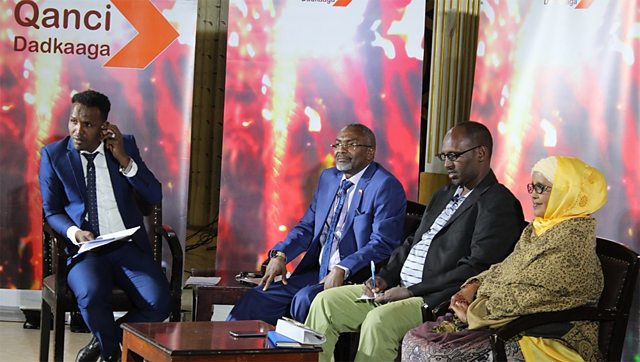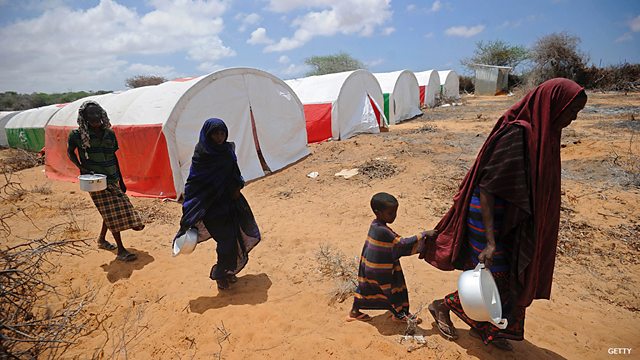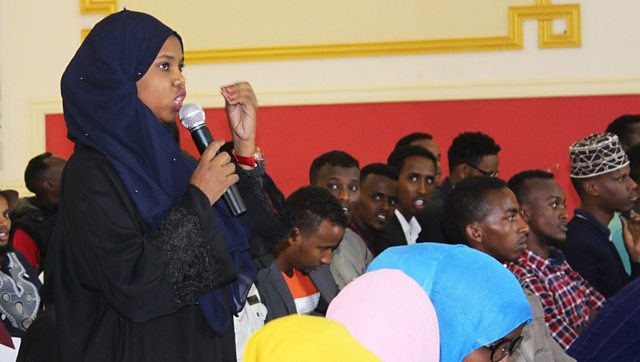Mohammed A. Gaas
Deputy Country Director, Somalia - BBC Media
“We often don’t get a chance to face our leaders and ask them questions. This was a good opportunity for us,” says 24 year-old Abdirizack Walanwal from Burao in Somaliland
There is a magic about Qanci Dadkaaga as you walk into a recording. Enthusiasm fills the hall as one person sets out chairs for the audience, another runs a soundcheck, someone else replaces a broken microphone.
From managers, researchers, finance officers, producers and studio operators as well as reporters – our production team is a diverse mix of men and women - and everybody helps everybody.
It’s teamwork at it’s finest, a team I’m proud produces the only debate show of its kind in the country. Qanci Dadkaaga translates as “Convince Your People” it holds true to it’s name, acting as a two-way bridge connecting the population to their leaders.

It helps the audience hold their leaders accountable on important issues that affect their lives and enables those in power to provide information about important projects that have been accomplished in the public interest.
Originally the programme was only made in Hargeisa City but now, in partnership with The Horn Cable TV, we’ve been recording in different regions across Somaliland since April 2016.
“Drought affects everyone of us”
It was eye opening for our audiences, many of whom didn’t know they had the right to challenge leaders about how their taxes are spent, and highlighted the pressing need for people in local regions to have their voices heard by those in power.
The results were often immediate and powerful.
In Burao the TV audience and panellists debated local issues around health which resulted in the immediate closure of an illegal slaughter-house operating in a residential area and a regional official being charged with corruption.
And, the impact of drought across the country was a major talking point.
Originally the programme was only made in Hargeisa City but now, in partnership with The Horn Cable TV, we’ve been recording in different regions across Somaliland since April 2016.
“Drought affects everyone of us”
It was eye opening for our audiences, many of whom didn’t know they had the right to challenge leaders about how their taxes are spent, and highlighted the pressing need for people in local regions to have their voices heard by those in power.
The results were often immediate and powerful.
In Burao the TV audience and panellists debated local issues around health which resulted in the immediate closure of an illegal slaughter-house operating in a residential area and a regional official being charged with corruption.
And, the impact of drought across the country was a major talking point.

“While drought affects everyone of us, we again see lorry-loads of charcoal getting into this town every day!” audience member Ayaan Ismail said at a debate in Hargeisa before asking “What are you doing about the practise of cutting down trees?”
Questions like this pushed panellists to give answers on plans to reduce the impact of the drought, promises made to help rebuild livelihoods and the enforcement of laws on deforestation.
Questions like this pushed panellists to give answers on plans to reduce the impact of the drought, promises made to help rebuild livelihoods and the enforcement of laws on deforestation.
We enabled people in Berbera, Borama, Burao, Erigavo and Gabiley in Western and Eastern regions to raise their hands to ask their local leaders about health services, taxes, jobs, public land, rebuilding livelihoods after severe drought, issues for internally displaced people, inflation and corruption.
Over 20,000 viewers on average tune in to watch Convince Your People online and through the supporting radio programmes we’re widening the discussion and the impact it can have.

Banning plastic containers
In a recent episode of our radio discussion programe Wayaaha Nolosha (Moments of Life), participants discussed how milk vendors transport milk across the country, usually in hard to clean and unhygienic plastic containers (jerry-cans).
The local residents made many suggestions on the show such as making steel containers compulsory because they are easy to clean and scientifically approved in dairy companies around the world, banning the sale of plastic containers and enforcing police check points.
Many local milk vendors immediately started using steel containers after hearing the programme, and the local councils in Hargeisa and Mogadishu held extra meetings to discuss the points raised and to enforce new rules.
Listen to your people
We also mentored local station Radio Hargeisa which is now producing a spin-off radio programme Magal Dadkaaga (Listen to Your People) – and challenging the status quo. After a power company declined to join a debate about the price of electricity, they convinced a local minister to stop the broadcast of the show for two weeks.
But after we met the Minister of Information and highlighted the importance of accountability programmes like Listen to Your People the power company agreed to join an on air debate and then reduced their prices.
“I was very happy, when I heard my voice, on Radio Hargeisa, asking questions to the leaders,” said Hargeisa resident Ali Qawdhan.
“I never thought this could be possible, especially on the state-owned station.”
--
Mohamed A. Gaas is Deputy Country Director for BBC Media Action in Somalia
-Qanci Dadkaaga (Convince Your People) is a BBC Media Action TV Debate Show funded by UK Aid through Mott Macdonald.
-Wayaaha Nolosha ( Moments of Life) radio programme is produced by BBC Media Action in Hargeisa and aired by the Somali service covering Puntland, South central Somalia and Somaliland, to help citizens raise issues about national development and enhancing their living standards.
-Magal Dadkaaga (Listen to Your People) is produced by Radio Hargeisa under our mentorship.